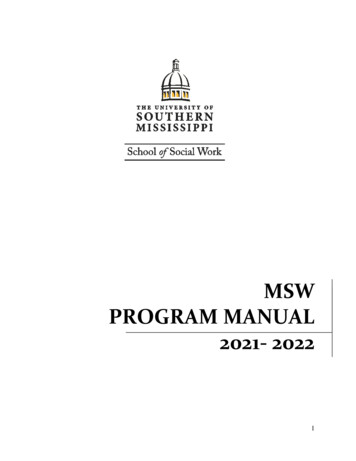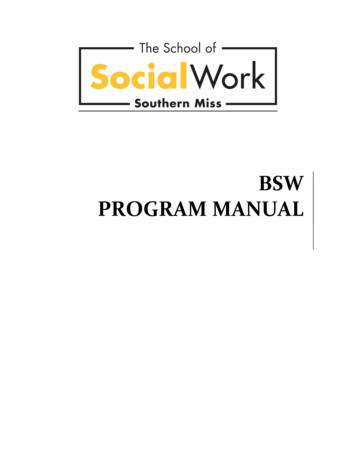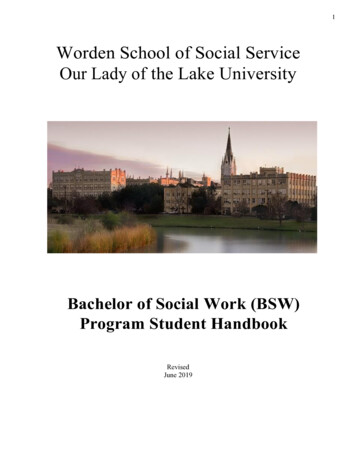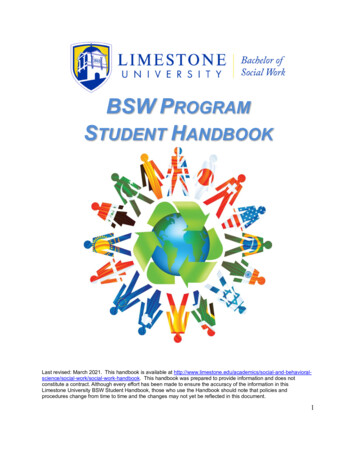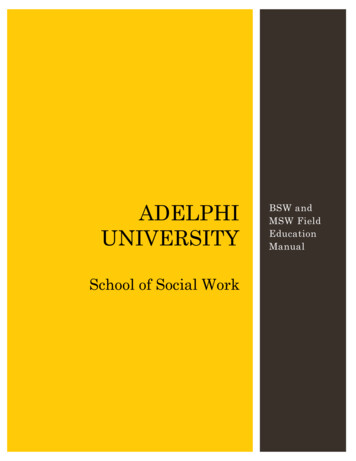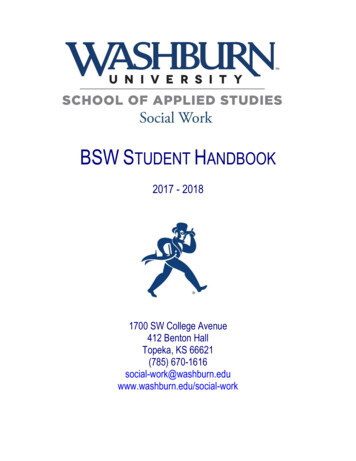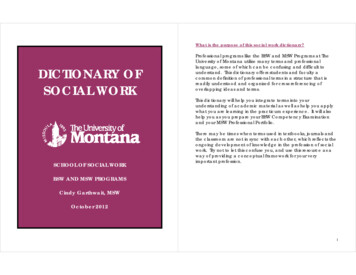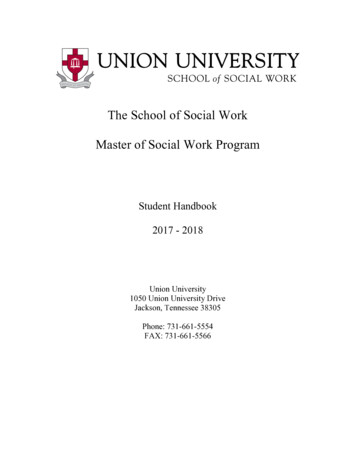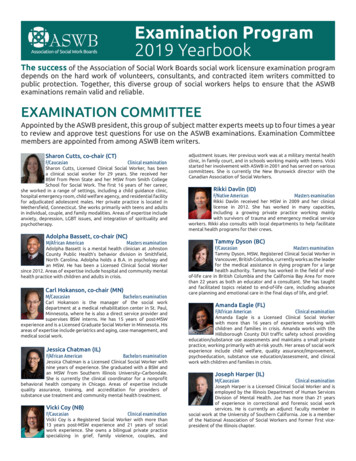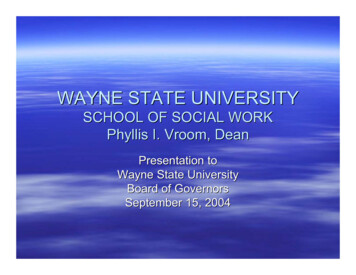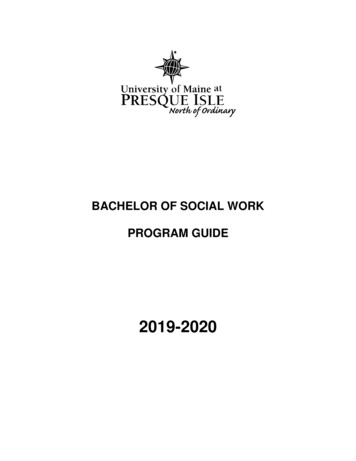
Transcription
BACHELOR OF SOCIAL WORKPROGRAM GUIDE2019-2020
BSW Program Guide – Revised 2019TABLE OF CONTENTSPageINTRODUCTION. 1MISSION AND GOALS OF THE BACHELOR OF SOCIAL WORK PROGRAM . 4THE GENERALIST MODEL OF SOCIAL WORK PRACTICE . 4BACCALAUREATE EDUCATIONAL OUTCOMES . 9THE BACCALAUREATE SOCIAL WORK CURRICULUM . 10BSW COURSE DESCRIPTIONS . 12ADVISEMENT . 17APPLYING FOR THE SOCIAL WORK MAJOR . 19FIELD PRACTICUM . 20BSW PROGRAM POLICIES . 25UNIVERSITY POLICIES . 27ADDITIONAL INFORMATION. 29THE BACHELOR OF SOCIAL WORK DEGREE (BSW) . 31STUDENT RIGHTS AND RESPONSIBILITIES . 32ACADEMIC REVIEW PROCESS . 33STUDENT GRIEVANCE PROCEDURES . 35APPENDIX A – BSW Faculty . 36APPENDIX B – Personal Statement Form. 38APPENDIX C - BSW Course Requirements . 44APPENDIX D - Transfer Course Requirements . 46APPENDIX E - General Education Curriculum . 48APPENDIX F - Code of Ethics of the National Association of Social Workers . 51APPENDIX G - Educational Policy and Accreditation Standards (EPAS) . 79APPENDIX H – Writing Guidelines . 92
BSW Program Guide – Revised 2019INTRODUCTIONWelcome to the Bachelor of Social Work Program at the University of Maine at PresqueIsle. We are delighted that you are considering a major in Social Work. This guide isdesigned to help you make an informed choice about this important life decision. Itdescribes the philosophy, the requirements and the operation of our program. It alsoincludes a copy of the Code of Ethics of the National Association of Social Workers, andprogram application questions which may help you make up your mind about a social workcareer. If you decide to pursue a major in social work, we hope that the information in ourguide will help you plan a productive educational experience in our school.Before you decideCarefully examine the material in this guide, and think about it as you assess your interestin the field of social work. You should pay special attention to the Code of Ethics of theNational Association of Social Workers in Appendix F.Our faculty are available to discuss the social work major with you and to help you answerthe questions which are sure to arise as you move toward making a choice of careers. Afteryou have reviewed the program guide, you may contact the Director of the BSW Program(768-9427) to assist you with the process.What is social work?Social work is a profession concerned with promoting the well-being of people and includesassisting individuals, families, groups, organizations, and communities to achieve lifeenhancing goals. The profession is especially concerned with the advancement of economicand social justice. Social workers view people and their environment as integrally intertwinedand interdependent. Therefore, social workers not only work with individuals towardpersonal change, but also share a commitment to working for changes in institutions andsociety. This view means that social work is a generalist profession, where members areeducated to take a broad view of the issues and challenges confronting any person or groupof people.The underlying purpose of social work practice is to release human powerin individuals for personal fulfillment and social good, and to release socialpower for the creation of the kinds of societies, social institutions, and socialpolicies which make self-realization most possible for all individuals. Twovalues which are primary in such purposes are respect for the worth and dignityof every individual and concern that all individuals have the opportunity torealize their potential as individually-fulfilled, socially-contributing persons(paraphrased from Khinduka, 1987).1
BSW Program Guide – Revised 2019Social workers respond to human needs and problems from birth to death. We practice in awide range of settings -- in pre-schools, homes for the aged, schools, legislatures, hospitalsand clinics, group homes and half-way houses, settlement houses and community centers,private agencies, in public departments of human services, probation and parole, grassrootssocial change organizations and social policy think-tanks, trade unions and employeeassistance programs, and many other settings.Within these settings, social workers are educated as generalist practitioners and carry awide range of activities, roles, and responsibilities. Bachelor level social workers function asbrokers and educators, advocates and community organizers, researchers and policyanalysts, case managers, supervisors and administrators.Social work is an evolving, relatively young profession that began in the urban upheavals ofthe 1880s. Professional education did not begin until after the beginning of the 20th century.Social work as a profession recognizes that the primary commitment of a professional is tothe professional practice itself rather than to an employer.Thus, the profession of social work requires practitioners who are flexible, socially andpolitically aware, self-motivated, eager to learn over a lifetime, desirous of personal growth,altruistic, comfortable with ambiguity, and interested in changing social conditions that areadverse to healthy human development, self-determination, and social justice.This dedication to the profession of social work is evidenced by four importantcharacteristics: a specialized body of knowledge and skills, operation within a Code ofEthics, the practice of self-regulation, and the maintenance of an autonomous identitythrough the existence of a professional association.Specialized Body of Knowledge and SkillsSocial work education programs are now accredited by a major national organization, theCouncil on Social Work Education (CSWE). Programs in Canada are also recognized by abody that works collaboratively with CSWE. Professionally trained social workers mustmaster a large body of knowledge based on core competencies about all aspects of humanand social functioning. Training in these areas distinguishes professional social workersfrom other professionals and from “natural” helpers. In the University of Maine at PresqueIsle’s Bachelor of Social Work Program (BSW), moderately sized classes, field seminars,conference attendance, local and international field trips and other small group experiencesprovide the context in which BSW students can gain the knowledge, values, and skillsnecessary to be confident and competent professionals.Code of EthicsA Code of Ethics is “an explicit statement” of the values, principles, and rules of a professionthat regulates the conduct of its members (Whitaker and Federico, 1996). The professionalCode of Ethics protects clients from exploitation by professionals and agencies. The codealso extends protection in the form of guaranteeing that information2
BSW Program Guide – Revised 2019will be kept confidential, that people will be treated with respect, fairness, and equality, andthat they will retain control over decision making about their own lives. Finally, the Code ofEthics protects the user’s right to receive competent services. Practice consistent with theCode of Ethics of the National Association of Social Workers is a major feature whichdistinguishes social work from many other disciplines and vocations.This program demonstrates its mission to promote social work by its commitment to theCode of Ethics. Practice consistent with the Code of Ethics of the National Association ofSocial Workers is the major feature which distinguishes social work from many otherdisciplines and vocations. Second, in keeping with the NASW Code, social workers have along-standing commitment to working with and on behalf of people who are economicallyand socially disadvantaged, vulnerable, and discriminated against. Finally, social workersshare a common set of basic, generalist skills that enable them to work with diversepopulations and to fill diverse roles in diverse settings.Self Regulation and AutonomyProfessions claim the right and responsibility to monitor the behavior of their members. Thismakes them self-regulating and autonomous, meaning that control over the behavior of themembers occurs primarily within the profession rather than from outside.The National Association of Social Workers has established committees of inquiry at thenational and state chapter levels. There are also laws and procedures regulating the socialwork profession at the level of state governance. In the State of Maine, society regulates thepractice of social work through licensure at both the Bachelor’s and Master’s level ofeducation. The statute in Maine State Law that governs the practice and use of the title“Social Worker” is Title 32, Chapter 83 within the Department of Professional and FinancialRegulation.Professional AssociationsMembers are provided with a source of professional identity through affiliation withassociations. The major professional social work organization is the National Association ofSocial Workers (NASW), which has four basic functions:1.2.3.4.Promote Professional DevelopmentEstablish and Maintain Standards of PracticeAdvance Sound Social PoliciesProvide Membership ServicesGraduates from this program and students in the program are eligible for full membershipin NASW. Applications for membership may be obtained online or from the faculty of theBSW program.3
BSW Program Guide – Revised 2019MISSION AND GOALS OF THE BACHELOR OF SOCIAL WORK PROGRAMMISSIONIn conjunction with the mission statement of the University of Maine at Presque Isle theBachelor of Social Work Program is committed to preparing students for entry-levelprofessional generalist practice. Global consciousness will be emphasized as the meansto understand and practice social work ethics, values, and skills across all systems.BSW Goals1. Educate individuals to enter social work practice across all systems.2. Develop critical thinking and self awareness with regard to global consciousness.3. Provide educational opportunities to analyze, formulate, and research social policy.4. Prepare individuals to effect change though practice in rural and globalcommunities.THE GENERALIST MODEL OF SOCIAL WORK PRACTICEThe overall purpose of the Bachelor of Social Work program is to prepare students forentry-level professional generalist social work practice and provide the foundation andpreparation for advanced study. The program builds from the humble beginnings of theprofession. Beginning in the late 1800’s the United States saw the growth of twoapproaches to helping people; the Settlement House movement and the CharityOrganization Societies. Both approaches were developed out of concern about ‘what todo’ with the massive influx of immigrants to North America from all over the world.Settlement houses operated on the belief that creating systems of support in communitiesand organizations was the best way to helping immigrant groups successfully transition toAmerican society. Much of the work done in the settlement houses was later incorporatedinto state and federal social welfare policies.During this same era, Charity Organization Societies were created in many urban settingsby concerned citizens who wished to help individuals and families. These groups consistedof wealthy people who were primarily compelled by religious tenets to help people who aredisadvantaged. The underlying function of the groups was to try and reduce the crime,disease, and social anomie that came to define immigrant groups in urban settings. Thisgroup employed ‘friendly visitors’ who were usually upper middle class, young, singlewomen. The visitors went to the city’s immigrant enclaves and were charged withdetermining what was most needed by the people in that setting. Reports to the societywould then lead to committee decisions about what, if any of the needs would be addressed.Most of the time, the society would arrange for things such as blankets or food and did notbelieve in providing money.4
BSW Program Guide – Revised 2019These two ways of helping evolved into the current concept of social work. Undergraduatesocial work education focuses on preparing people to practice beginning generalist socialwork.Kirst-Ashman (2010) defines generalist social work practice as:The application of an eclectic knowledge base, professional values, and a wide rangeof skill to target any size system for change within the context of four primaryprocesses. First, generalist practice emphasizes client empowerment. Second, itinvolves working effectively within an organizational structure and doing so undersupervision. Third, it requires the assumption of a wide range of professional roles.Fourth, it involves the application of critical thinking skills to the planned change(intervention) process. (p. 27, Social Work and Social Welfare; Critical ThinkingPerspectives)Social workers educated as generalists possess a knowledge, value and skill base that isreadily transferable among diverse contexts, locations, and problem situations. Generalistpractice incorporates skills to work within the five major systems in our society: individuals,families, groups, organizations, and communities. The generalist repertoire also includesskills applicable to the tasks of lifelong learning and to adaptation of the generalist foundationto specialized situations and contexts.The University of Maine at Presque Isle Bachelor of Social Work program is anchored in thedoctrine of the generalist model. Generalist social work education enhances theeffectiveness of graduates in addressing and alleviating the varied social problems of ourregion. The UMPI BSW program resides in a geographically and socially isolated area. Theprogram stresses that by starting where the client is and by utilizing their own strengthsempowers people to move toward positive change. The economic base for rural Maine isdriven by either global industry such as tourism and lumbering or self employment.Therefore, service delivery is most often organized through not-for-profit agencies andorganizations. Social workers are the backbone to that workforce. The rural social servicedelivery systems of Maine are in need of practitioners who can competently fulfill a varietyof practice roles, e.g., broker, advocate, administrator, case manager, networker,community organizer, group facilitator, change agent. Lastly, the ability to ask the salientquestions, determine the best means of addressing issues, and then implementing thestrategies to effect change describes the critical thinking aspect of this BSW program.5
BSW Program Guide – Revised 2019The Professional FoundationThe Bachelor of Social Work program education foundation focuses on generalistpractice from a rural context. This program is framed by infusion of the strengthsperspective, with particular attention to diversity and qualitative assessment of practice. TheBSW curriculum is organized into eight (8) foundation content areas, each made up of asequence of courses. Content on social work values and ethics, diversity, social andeconomic justice, and populations-at-risk is infused throughout the eight foundationcurriculum content areas. The professional foundation includes courses in:1. Values and EthicsSocial Work education programs integrate content about values and principles ofethical decision making as presented in the National Association of Social WorkersCode of Ethics. The educational experience provides students with the opportunityto be aware of personal values; develop, demonstrate, and promote the values ofthe profession; and analyze ethical dilemmas and the ways in which these affectpractice, services, and clients.2. DiversitySocial work programs integrate content that promotes understanding, affirmation,and respect for people from diverse backgrounds. The content emphasizes theinterlocking and complex nature of culture and personal identity. It ensures that socialservices meet the needs of groups served and are culturally relevant. Programseducate students to recognize diversity within and between groups that may influenceassessment, planning, intervention, and research. Students learn how to define,design, and implement strategies for effective practice with persons from diversebackgrounds.3. Populations-at-Risk and Social and Economic JusticeSocial work education programs integrate content on populations-at-risk, examiningthe factors that contribute to and constitute being at risk. Programs educate studentsto identify how group membership influences access to resources, and presentcontent on the dynamics of such risk factors and responsive and productive strategiesto redress them.Programs integrate social and economic justice content grounded in anunderstanding of distributive justice, human and civil rights, and the globalinterconnections of oppression. Programs provide content related to implementingstrategies to combat discrimination, oppression, and economic deprivation and topromote social and economic justice. Programs prepare students to advocate fornondiscriminatory social and economic systems.6
BSW Program Guide – Revised 20194. Human Behavior and the Social EnvironmentSocial work education programs provide content on the reciprocal relationshipsbetween human behavior and social environments. Content includes empiricallybased theories and knowledge that focus on the interactions between and amongindividuals, groups, societies, and economic systems. It includes theories andknowledge of biological, sociological, cultural, psychological, and spiritualdevelopment across the life span; the range of social systems in which people live(individual, family, group, organizational, and community); and the ways socialsystems promote or deter people in maintaining or achieving health and well-being.5. Social Welfare Policy and ServicesPrograms provide content about the history of social work, the history and currentstructures of social welfare services, and the role of policy in service delivery, socialwork practice, and attainment of individual and social well-being. Course contentprovides students with knowledge and skills to understand major policies that formthe foundation of social welfare; analyze organizational, local, state, national andinternational issues in social welfare policy and social service delivery; analyze andapply the results of policy research relevant to social service delivery; understandand demonstrate policy practice skills in regard to economic, political, andorganizational systems, and use them to influence, formulate, and advocate for policyconsistent with social work values; and identify financial, organizational,administrative, and planning processes required to deliver social services.6. Social Work PracticeSocial work practice content is anchored in the purposes of the social work professionand focuses on strengths, capacities, and resources of client systems in relation totheir broader environments. Students learn practice content that encompassesknowledge and skills to work with individuals, families, groups, organizations, andcommunities. The content includes engaging clients in an appropriate workingrelationship, identifying issues, problems, needs, resources, and assets; collectingand assessing information; and planning for service delivery. It includes usingcommunication skills, supervision, and consultation. Practice content also includesidentifying, analyzing, and implementing empirically based interventions designed toachieve client goals; applying empirical knowledge and technological advances;evaluating program outcomes and practice effectiveness; developing, analyzing,advocating, and providing leadership for policies and services; and promoting socialand economic justice.7
BSW Program Guide – Revised 20197. ResearchQualitative and quantitative research content provides understanding of a scientific,analytic, and ethical approach to building knowledge for practice. The contentprepares students to develop, use, and effectively communicate empirically basedknowledge, including evidence-based interventions. Research knowledge is used bystudents to provide high-quality services; to initiate change; to improve practice,policy, and social service delivery; and to evaluate their own practice.8. Field EducationField education is an integral component of social work education anchored in themission, goals, and educational level of the program. It occurs in settings thatreinforce students’ identification with the purposes, values, and ethics of theprofession; fosters the integration of empirical and practice-based knowledge; andpromotes the development of professional competence. Field Education issystematically designed, supervised, coordinated, and evaluated on the basis ofcriteria by which students demonstrate the achievement of program objectives.8
BSW Program Guide – Revised 2019BACCALAUREATE EDUCATIONAL LEARNING OUTCOMESThe nine Social Work Competencies are listed below. Programs may add competencies thatare consistent with their mission and goals and respond to their context. Each competencydescribes the knowledge, values, skills, and cognitive and affective processes that comprisethe competency at the generalist level of practice, followed by a set of behaviors that integratethese components. These behaviors represent observable components of the competencies,while the preceding statements represent the underlying content and processes that inform thebehaviors.Competency 1: Demonstrate Ethical and Professional BehaviorCompetency 2: Engage Diversity and Difference in PracticeCompetency 3: Advance Human Rights and Social, Economic, and Environmental JusticeCompetency 4: Engage In Practice-informed Research and Research-informed PracticeCompetency 5: Engage in Policy PracticeCompetency 6: Engage with Individuals, Families, Groups, Organizations, and CommunitiesCompetency 7: Assess Individuals, Families, Groups, Organizations, and CommunitiesCompetency 8: Intervene with Individuals, Families, Groups, Organizations, andCommunities Competency 9: Evaluate Practice with Individuals, Families, Groups,Organizations, and Communities9
BSW Program Guide – Revised 2019THE BACCALAUREATE SOCIAL WORK CURRICULUMThe Bachelor of Social Work curriculum is designed to enable our students to acquire theliberal arts perspective and the professional foundation of knowledge, values and skills thatare necessary for competent, beginning level social work practice.The Liberal Arts PerspectiveThe liberal arts perspective is acquired through a range of academic study which includesrelevant content in behavioral science, social science, humanities, and physical science.This provides a foundation for acquiring professional knowledge, relevant concepts,professional values, and the interactive skills necessary for beginning social work practice.A liberal arts perspective includes an understanding of our national cultural heritages anddiversity, the range of methods of inquiry and development of knowledge. To achieve this,the BSW educational policy provides curricula that build on a liberal arts perspective topromote breadth of knowledge, critical thinking, and communication skills (CSWEEducational Policy Accreditation and Accreditation Standards, 2008:1.2).A liberal arts education encourages students to think critically and flexibly about thecharacteristics and dynamics of society, organizations, groups. families, and individuals andhow these are expressed through the arts, literature, science, history, philosophy, socialmovements, and the social stratification system. This perspective also enables students tounderstand a broad range of determinants of individual and group behavior, culture, socialconditions, and social problems.Proficiency in both written and spoken communication is integral to acceptable attainmentof the liberal arts perspective as defined by the University of Maine at Presque Isle.The University of Maine at Presque Isle faculty has developed the general educationcurriculum in accordance with the goals of the University:1. To provide students with the competencies necessary for academic and professionalsuccess2. To expose students to multiple methods of gathering and employing knowledge inorder to facilitate long-term learning not limited to a single discipline3. To prepare students to think critically and formulate effective responses to abroader range of texts, media, circumstances and institutions, so that they maybecome active and effective participants in communities both local and global.By providing a foundation of information and skills, the General Education Curriculuminsures that the graduate not only has knowledge of a major field but also the flexibility tothink critically and argue persuasively on a range of issues relevant to personal andprofessional life. Critical and conceptual thinking, sensitivity to the multiplicities of humanexperience, and acquisition of technical skills are pervasive through the educationalexperience at the University of Maine at Presque Isle.10
BSW Program Guide – Revised 2019The GEC then, is not simply a collection of courses representing different disciplines butrather a set of courses with common, interrelated aims. The GEC synthesizes disciplinesto provide a total university experience, producing a liberally educated graduate,regardless of major. The structural framework of the GEC addresses several concepts;some represent a body of knowledge, some skills and some an intellectual or ethicalperspective.The GEC is divided into two inter-connected sections: Foundations of Knowledge andApproaches to Learning. IN the Foundations section, students explore concepts ofLiteracy, Multicultural Experiences, and Quantitative Decision Making. This knowledge isapplied in the Approaches categories in which students explore Physical and LifeSciences, the Social Sciences, and Humanities and the Fine Arts. Furthermore, allstudents are required to enroll in at least one Technology Intensive course and a WritingIntensive course to help ensure the application of such competencies within theirrespective major.In addition to the general education requirements, BSW students must complete the corecourses in social work as well as elective courses of their choosing. BSW students arerequired to consult each semester with their academic advisors when planning their coursesof study.The Bachelor of Social Work Program at University of Maine at Presque Isle was developedto equip students with the beginning level generalist skills to practice social work. The BSWprogram reflects not only the mission and ideals of its host institution but also of the peopleand the region in which it is located. The BSW Program is built upon the professionalfoundation of knowledge, values and skills of social work and is designed to assist studentsin the achievement of the competencies developed and articulated by the Council on SocialWork Education.There are four curricular features that define these standards of social work education:1. Program mission and goalsProfessional purpose, infused with professional values and reflective of context2. Explicit curriculumCourses and curricular design to demonstrate the integration and application ofthe competencies in practice across systems of all sizes.3. Implicit curriculumEducational environment within which the explicit curriculum is developed.(governance, policies, student participation, administration)4. AssessmentContinuous feedback loop that measures competencies and demonstratescurricular changes to foster improvement in program and learning outcomes.11
BSW Program Guide – Revised 2019BSW CORE COURSE DESCRIPTIONSSWK 200 Introduction to Social Work and Social Welfare3 credits. Prerequisites: SOC 100 and/or PSY 100The course explores social work and other human service professions and how eachmeets
BSW Program Guide – Revised 2019 . TABLE OF CONTENTS . Page . . practice of social work through licensure at both the Bachelor’s and Master’s level of education. The statute in Maine State Law that governs the practice and use of the title . preparation for advanced study.
